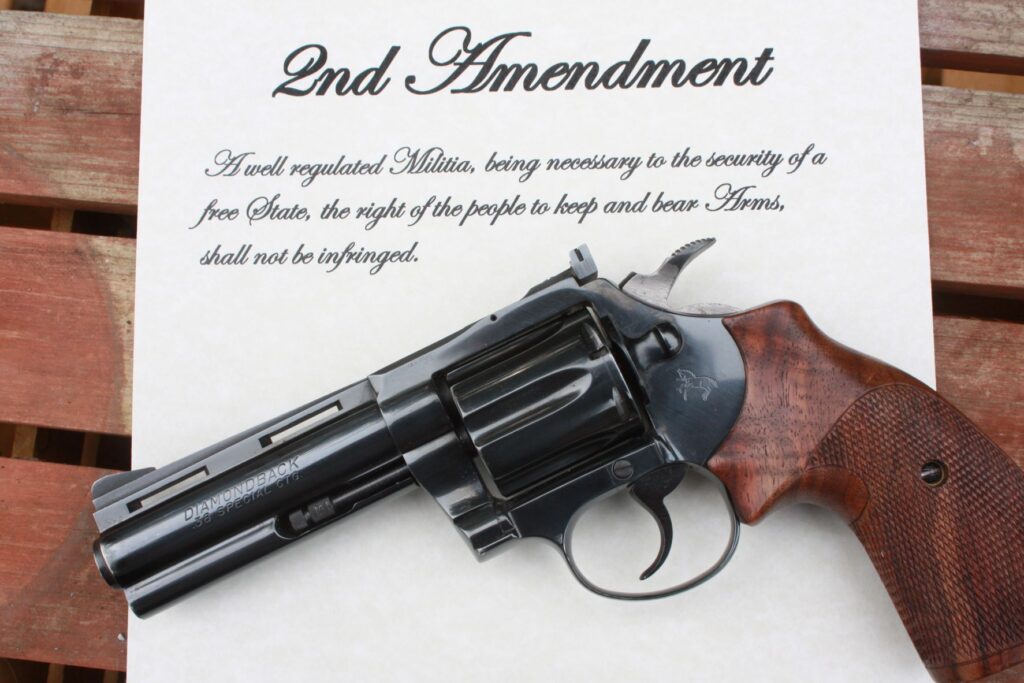
By Dave Workman
Editor-in-Chief
The Second Amendment Foundation and Citizens Committee for the Right to Keep and Bear Arms have submitted amicus briefs to the U.S. Supreme Court in a complicated, and controversial, gun rights case out of Texas which could provide a “reset” opportunity on a federal law that many believe is used to strip away Second Amendment rights unfairly.
The case is known as United States v. Rahimi.
Both briefs look at history—and encourage the court to do likewise—to determine whether there are historic an analogues which have been used to disarm whole classes of people based on the actions of a few individuals. As SAF noted in a news release, “SAF’s interest in this case is based on the fact that many firearms owners in this country suddenly find themselves subject to civil restraining orders, which deny them their fundamental constitutional right to keep and bear arms in a manner that does not comport with the Second Amendment’s text, as informed by history.”
“As our brief explains,” noted SAF Executive Director Adam Kraut, “laws mandating total disarmament, in the relevant historical period, were related to disarming loyalists to preserve the integrity of our newly-formed government. The current federal law governing how gun owners’ rights are treated in relation to civil restraining orders lacks any well-established historical analogue.”
Historically, at the time of the Founding, any laws that disarmed an entire category of people were limited to those individuals who remained loyal to the crown because they posed a threat to the success of the patriot cause in the Revolutionary War. Many of these people were literally considered to be enemy combatants and the total disarmament was viewed in the context of a war and the survival of a fledgling nation. Today’s laws that disarm private citizens subject to civil restraining orders must be considered in a peacetime context, where national security is not an issue.
SAF is represented by attorneys Edward A. Paltzik and Meredith Lloyd of Bochner PLLC in New York.
Meanwhile, CCRKBA teamed up with Prof. William English, Ph.D., to submit an amicus brief in the case.
English is a political economist and assistant professor of Strategy, Economics, Ethics, and Public Policy at the McDonough School of Business, Georgetown University. He has held teaching and research positions at Brown University and Harvard University before joining the faculty of Georgetown. In 2021, English conducted the largest-ever nationally representative survey of firearms owners, which estimated how frequently firearms are used for self-defense. The National Firearms Survey was the subject of an amicus brief submitted in New York State Rifle & Pistol Association, Inc. v. Bruen.
Like SAF, CCRKBA is not a party to the case, known as United States v. Rahimi. The amicus brief was submitted by attorneys Craig L. Uhrich and Serge Krimnus at Bochner PLLC in New York.
As noted in the brief, Domestic Violence Restraining Orders (“DVROs”), such as the one at issue in this case, are a relatively recent addition to the American legal landscape. The standards for obtaining DVROs vary by jurisdiction, and multiple studies have shown that such orders are widely abused, often in an effort by a party to obtain a tactical advantage during divorce and child custody cases. Though DVROs are often part of the legal process in such cases, the empirical evidence that restrictions on firearms ownership accompanying such orders are effective at preventing domestic violence is weak. The federal statute is known as § 922(g)(8).
“Our brief explores the statistical and sociological basis for rejecting the denial of fundamental constitutional rights to individuals who may be the subject of a DVRO,” noted CCRKBA Chairman Alan Gottlieb. “The restriction of firearms ownership under current federal law lacks a compelling empirical justification when all costs and benefits are considered.”
The brief clearly explains that laws can be structured in ways that allow criminal prosecutions against individuals who make genuine threats of violence, or allow involuntary civil commitments against those who are adjudicated to pose a physical threat to themselves or others due to mental illness, with the accused having access to “robust due process.”
“As we explain in our brief,” Gottlieb said, “depriving an entire class of citizens of their rights based on group characteristics that are not a product of Due Process is legally perilous. Plainly, if someone is considered too dangerous to be in society with a firearm, then he or she is too dangerous to be in society, period. The law should be directed at individual behavior rather than penalize an entire group for things they haven’t done.”



